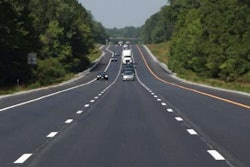 An autonomous sedan from Uber’s self-driving fleet in Pittsburgh, Pa.
An autonomous sedan from Uber’s self-driving fleet in Pittsburgh, Pa.The National Association of City Transportation Officials (NACTO) has released a framework of principles for data sharing by private transportation providers, such as Uber, to help improve “working relationships” between these entities and cities.
NACTO is made up of representatives from 49 major North American cities “formed to exchange transportation ideas, insights, and practices and cooperatively approach national transportation issues.”
“Cities seek the best data to understand, manage, and maintain increasingly congested street networks,” NACTO says. “New mobility providers collect high-quality GPS data that can provide unique and timely insights into the operation of city streets.”
These principles come at a time of increase cooperation among mobile transportation apps and city, county and state governments, with the prime example being the Waze Connected Citizens Program.
The principles, the association reports will “set a path forward for”:
- Better Data for Transportation Planning – The association says this will help cities to better manage their streets, curb space and prioritize the movement of people.
- Inclusion in Mobility Options – This, NACTO says, will provide the “equitable provision of mobility service.”
- Better Tools for Safety – Cities can use the data shared to identify and improve design issues.
“Los Angeles has one of the most extensive, and congested, street networks in the world,” says Seleta Reynolds, general manager of the Los Angeles Department of Transportation and NACTO president. “We must have high-quality data from new mobility providers to achieve and measure our goals to save lives, manage congestion, grow our economies, and strengthen our cities.”
“Without data, cities are driving blind,” says Janette Sadik-Khan, Transportation Principal at Bloomberg Associates and NACTO chair. “Governments need new standards and ride companies like Uber need to read the data written on the wall.”
The framework is available for review here.









